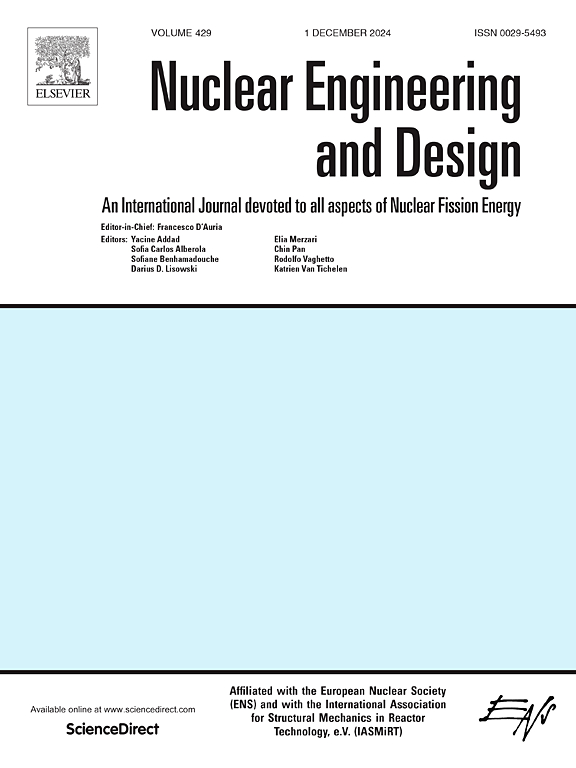Robust controller design strategies with improved performance for MSBR core
IF 1.9
3区 工程技术
Q1 NUCLEAR SCIENCE & TECHNOLOGY
引用次数: 0
Abstract
Designing controllers for power regulation of nuclear reactors is a challenging task because of its non-linear behavior, and fluctuation of system parameters over time in response to changes in power levels. Motivated by the aforementioned fact, proportional-integral (PI) controllers are designed in this manuscript to regulate the core power of the molten salt breeder reactor (MSBR) by employing the all stabilizing region and quantitative feedback theory (QFT) technique. In the first approach, the entire stability region is plotted in the ()-plane. In order to ensure safe operation, the reactivity of control rods must lie in the specified range. Hence, the control effort constrained stability region (CECSR) is obtained within the all stability region to design the PI controller. A novel PI controller and a pre-filter based on gain-phase shaping on Nichols chart are also proposed. Robustness, disturbance rejection and relative stability of the system are addressed by obtaining the performance bounds on Nichols chart. Simulation results illustrate that the closed-loop system is exhibiting a noteworthy improvement in the closed loop performance over the latest reported control strategies.
改进MSBR核性能的鲁棒控制器设计策略
由于核反应堆的非线性特性,以及系统参数随功率水平变化而随时间波动的特点,设计核反应堆功率调节控制器是一项具有挑战性的任务。基于上述事实,本文设计了比例积分(PI)控制器,采用全稳定区和定量反馈理论(QFT)技术对熔盐增殖反应堆(MSBR)的堆芯功率进行调节。在第一种方法中,整个稳定区域绘制在(Kp,Ki)平面上。为了保证安全运行,控制棒的反应性必须在规定的范围内。因此,在所有稳定区域内获得控制努力约束稳定区域(CECSR)来设计PI控制器。提出了一种新的PI控制器和基于Nichols图的增益相位整形预滤波器。通过求得Nichols图上的性能界,解决了系统的鲁棒性、抗干扰性和相对稳定性问题。仿真结果表明,该闭环系统的闭环性能比最新报道的控制策略有显著提高。
本文章由计算机程序翻译,如有差异,请以英文原文为准。
求助全文
约1分钟内获得全文
求助全文
来源期刊

Nuclear Engineering and Design
工程技术-核科学技术
CiteScore
3.40
自引率
11.80%
发文量
377
审稿时长
5 months
期刊介绍:
Nuclear Engineering and Design covers the wide range of disciplines involved in the engineering, design, safety and construction of nuclear fission reactors. The Editors welcome papers both on applied and innovative aspects and developments in nuclear science and technology.
Fundamentals of Reactor Design include:
• Thermal-Hydraulics and Core Physics
• Safety Analysis, Risk Assessment (PSA)
• Structural and Mechanical Engineering
• Materials Science
• Fuel Behavior and Design
• Structural Plant Design
• Engineering of Reactor Components
• Experiments
Aspects beyond fundamentals of Reactor Design covered:
• Accident Mitigation Measures
• Reactor Control Systems
• Licensing Issues
• Safeguard Engineering
• Economy of Plants
• Reprocessing / Waste Disposal
• Applications of Nuclear Energy
• Maintenance
• Decommissioning
Papers on new reactor ideas and developments (Generation IV reactors) such as inherently safe modular HTRs, High Performance LWRs/HWRs and LMFBs/GFR will be considered; Actinide Burners, Accelerator Driven Systems, Energy Amplifiers and other special designs of power and research reactors and their applications are also encouraged.
 求助内容:
求助内容: 应助结果提醒方式:
应助结果提醒方式:


